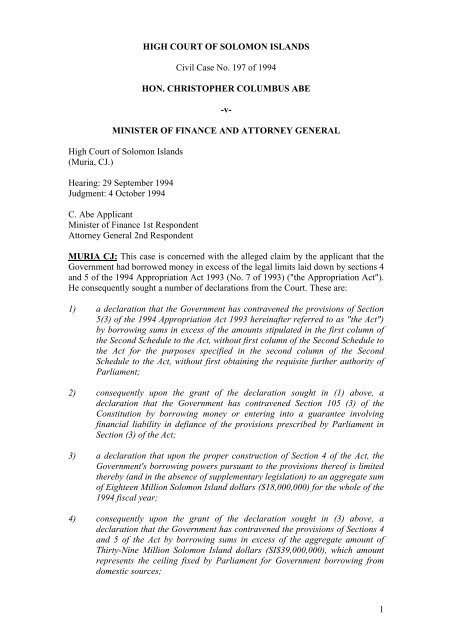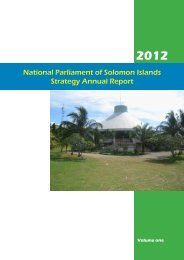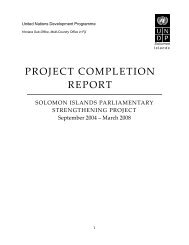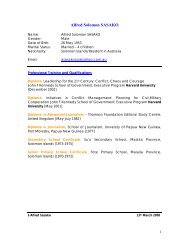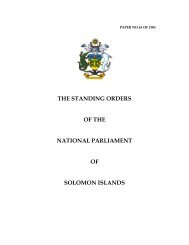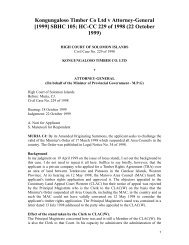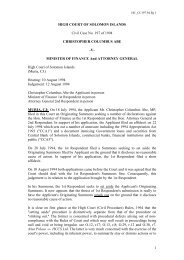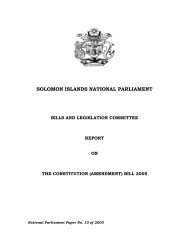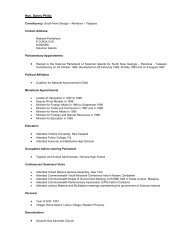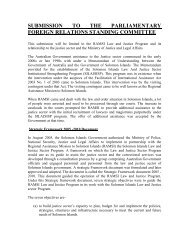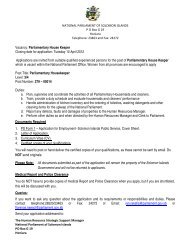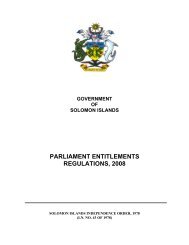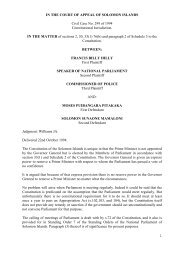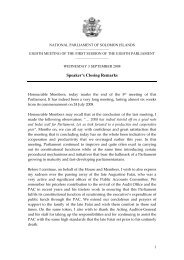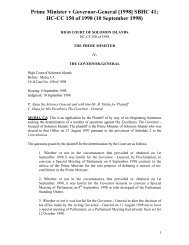Abe v Min. Fin.pdf - National Parliament of Solomon Islands
Abe v Min. Fin.pdf - National Parliament of Solomon Islands
Abe v Min. Fin.pdf - National Parliament of Solomon Islands
You also want an ePaper? Increase the reach of your titles
YUMPU automatically turns print PDFs into web optimized ePapers that Google loves.
HIGH COURT OF SOLOMON ISLANDS<br />
Civil Case No. 197 <strong>of</strong> 1994<br />
HON. CHRISTOPHER COLUMBUS ABE<br />
-v-<br />
MINISTER OF FINANCE AND ATTORNEY GENERAL<br />
High Court <strong>of</strong> <strong>Solomon</strong> <strong>Islands</strong><br />
(Muria, CJ.)<br />
Hearing: 29 September 1994<br />
Judgment: 4 October 1994<br />
C. <strong>Abe</strong> Applicant<br />
<strong>Min</strong>ister <strong>of</strong> <strong>Fin</strong>ance 1st Respondent<br />
Attorney General 2nd Respondent<br />
MURIA CJ: This case is concerned with the alleged claim by the applicant that the<br />
Government had borrowed money in excess <strong>of</strong> the legal limits laid down by sections 4<br />
and 5 <strong>of</strong> the 1994 Appropriation Act 1993 (No. 7 <strong>of</strong> 1993) ("the Appropriation Act").<br />
He consequently sought a number <strong>of</strong> declarations from the Court. These are:<br />
1) a declaration that the Government has contravened the provisions <strong>of</strong> Section<br />
5(3) <strong>of</strong> the 1994 Appropriation Act 1993 hereinafter referred to as "the Act")<br />
by borrowing sums in excess <strong>of</strong> the amounts stipulated in the first column <strong>of</strong><br />
the Second Schedule to the Act, without first column <strong>of</strong> the Second Schedule to<br />
the Act for the purposes specified in the second column <strong>of</strong> the Second<br />
Schedule to the Act, without first obtaining the requisite further authority <strong>of</strong><br />
<strong>Parliament</strong>;<br />
2) consequently upon the grant <strong>of</strong> the declaration sought in (1) above, a<br />
declaration that the Government has contravened Section 105 (3) <strong>of</strong> the<br />
Constitution by borrowing money or entering into a guarantee involving<br />
financial liability in defiance <strong>of</strong> the provisions prescribed by <strong>Parliament</strong> in<br />
Section (3) <strong>of</strong> the Act;<br />
3) a declaration that upon the proper construction <strong>of</strong> Section 4 <strong>of</strong> the Act, the<br />
Government's borrowing powers pursuant to the provisions there<strong>of</strong> is limited<br />
thereby (and in the absence <strong>of</strong> supplementary legislation) to an aggregate sum<br />
<strong>of</strong> Eighteen Million <strong>Solomon</strong> Island dollars ($18,000,000) for the whole <strong>of</strong> the<br />
1994 fiscal year;<br />
4) consequently upon the grant <strong>of</strong> the declaration sought in (3) above, a<br />
declaration that the Government has contravened the provisions <strong>of</strong> Sections 4<br />
and 5 <strong>of</strong> the Act by borrowing sums in excess <strong>of</strong> the aggregate amount <strong>of</strong><br />
Thirty-Nine Million <strong>Solomon</strong> Island dollars (SI$39,000,000), which amount<br />
represents the ceiling fixed by <strong>Parliament</strong> for Government borrowing from<br />
domestic sources;<br />
1
5) consequently upon the grant <strong>of</strong> the declarations sought in (1), (2), (3) and (4)<br />
above, a declaration that any further borrowing by the Government and/or the<br />
First Respondent will be ultra vires the Act and Section 105 (3) <strong>of</strong> the<br />
Constitution;<br />
6) a declaration that the First Respondent has breached his constitutional and/or<br />
statutory and/or fiduciary obligations and has otherwise acted unlawfully by<br />
permitting and/or procuring the Government to borrow funds exceeding the<br />
prescribed amounts in violation <strong>of</strong> the Act and the Constitution;<br />
The brief background to the case is as follows. On 17 December 1993, the <strong>National</strong><br />
<strong>Parliament</strong> passed the 1994 Appropriation Act 1993 which appropriated the sum <strong>of</strong><br />
$298,140,998.00 to be applied for the service <strong>of</strong> the year ending 31 December 1994.<br />
Of that sum, $204,620,725 is for recurrent expenditure while $93,520,273 is for<br />
development expenditure. <strong>Parliament</strong> has also authorised the Government under the<br />
Act to borrow money by way <strong>of</strong> overdraft and advances not exceeding $18,000,000.<br />
Further <strong>Parliament</strong> has authorised the Government to borrow the maximum <strong>of</strong><br />
$23,000,000 for development projects in natural resources, economic infrastructure<br />
and human resources and the maximum <strong>of</strong> $21,000,000 for locally financing <strong>of</strong><br />
development projects and deficits the sources <strong>of</strong> which comes from sale <strong>of</strong><br />
Development Bonds, Treasury Bills, Saving Certificate and term loans from domestic<br />
financial institutions and NPF.<br />
It is necessary, before I proceed further, to set out the relevant provisions <strong>of</strong> the law<br />
relied on in this case. These are section 105(3) <strong>of</strong> the Constitution and sections 4 and<br />
5 <strong>of</strong> the Appropriation Act. Section 105(3) <strong>of</strong> the Condition is in the following terms:<br />
"105 (3) The Government shall not borrow money or enter into a guarantee<br />
involving any financial liability except in accordance with such provisions as<br />
may be prescribed by <strong>Parliament</strong>."<br />
I shall set out the provisions sections 4 and 5 <strong>of</strong> the Appropriation Act a little later in<br />
this judgement.<br />
The applicant had taken the Court into an examination <strong>of</strong> the various constitutional<br />
and statutory provisions regarding the sources and the extent <strong>of</strong> the Government's<br />
power to borrow money. I am grateful to the applicant for doing so. However, the<br />
question that the Court must answer, at the end <strong>of</strong> the day, is: Has the Government<br />
exceeded its domestic borrowing limits as provided by law? The applicant says that<br />
the Government has exceeded the limits set by law while the respondents say, they<br />
have not.<br />
With that question in mind, I now turn to consider the provisions <strong>of</strong> the laws referred<br />
to. Section 105(3) <strong>of</strong> the Constitution, says the applicant, is a constitutional<br />
prohibition on Government borrowing without authority from <strong>Parliament</strong>. I agree to<br />
that submission as it is clearly supported by the language <strong>of</strong> the provision which<br />
simply re-enforces the aged-old constitutional principle that <strong>Parliament</strong> retains the<br />
power to authorise the raising and expenditure <strong>of</strong> public finance. See AG -v- Wilts<br />
United Dairies Ltd [1921] 38 TLR 884, 886 where Lord Atkin stated:<br />
"No power to make a charge upon the subject for the use <strong>of</strong> the Crown could<br />
arise except by virtue <strong>of</strong> the prerogative or by a statue, and the alleged right<br />
under the prerogative was disposed <strong>of</strong> finally by the Bill <strong>of</strong> Rights... Though<br />
2
the attention <strong>of</strong> our ancestors was directed especially to abuses <strong>of</strong> the<br />
prerogative, there can be no doubt that this statute [i.e. the Bill <strong>of</strong> Rights]<br />
declares the law that no money shall be levied for or to the use <strong>of</strong> the Crown<br />
except by grant <strong>of</strong> <strong>Parliament</strong>. We know how strictly <strong>Parliament</strong> has<br />
maintained this right - and, in particular, how jealously the House <strong>of</strong><br />
Commons has asserted its predominance in the power <strong>of</strong> raising money. An<br />
elaborate custom <strong>of</strong> <strong>Parliament</strong> has prevailed by which money for the service<br />
<strong>of</strong> the Crown is only granted at the request <strong>of</strong> the Crown made by a<br />
responsible <strong>Min</strong>ister and assented to by a resolution <strong>of</strong> the House in<br />
Committee."<br />
As such any borrowing by the Government <strong>of</strong> money for its use must be authorised by<br />
<strong>Parliament</strong>. Expressed in another ways, as the learned Attorney General has<br />
submitted, it enables <strong>Parliament</strong> to control Government financing.<br />
On the same constitutional principle, reference has been made to section 209(1) <strong>of</strong> the<br />
Constitution <strong>of</strong> PNG and the case <strong>of</strong> the SCR No. 1 <strong>of</strong> 1990 (Re Provincial Grants)<br />
[1990] PNGLR 532 which concerned that provision section 209(1) <strong>of</strong> the PNG<br />
Constitution provides as follows:<br />
"209. (1) Notwithstanding anything in this Constitution, the raising and<br />
expenditure <strong>of</strong> finance by the <strong>National</strong> Government, including the imposition<br />
<strong>of</strong> taxation and the raising <strong>of</strong> loans, is subject to authorisation and control by<br />
the <strong>Parliament</strong>, and shall be regulated by an Act <strong>of</strong> <strong>Parliament</strong>."<br />
The Supreme Court <strong>of</strong> Papua New Guinea observed that provision as vesting the<br />
control over public finances in <strong>Parliament</strong>. Kapi, DCJ in his separate judgement had<br />
this to say on the same Constitutional provision:<br />
"The whole <strong>of</strong> the raising and expenditure <strong>of</strong> finance 'is subject to<br />
authorisation control by the <strong>Parliament</strong>.' To put it simply, the <strong>National</strong><br />
Government cannot raise or spend any money under any law unless it is<br />
authorised by <strong>Parliament</strong> under Section 209 (1) <strong>of</strong> the Constitution."<br />
The point has also been stated in Halsbury's Laws <strong>of</strong> England, Vol. 8 4 Ed, page 832,<br />
paragraph 1368 where it is stated that:<br />
"<strong>Parliament</strong> control over the revenue is threefold. It is exercised in respect <strong>of</strong><br />
(1) the raising <strong>of</strong> revenue (by taxation or borrowing); (2) its expenditure; and<br />
(3) the audit <strong>of</strong> public accounts."<br />
There are numerous other authorities on this point and it is not necessary for me to<br />
dwell in them. See G.C. Thornton, Legislative Drafting, Butterworths, London 1987,<br />
page 218; Pr<strong>of</strong>essor Cheryl Sanders, "Government Borrowing in Australia" (1989) 17<br />
Melbourne University Law Review, 187; and S.M. Mehta, A Commentary on Indian<br />
Constitutional Law (1990), 2nd ed. page 373.<br />
Like other common law countries that follow the British system <strong>of</strong> government,<br />
<strong>Solomon</strong> <strong>Islands</strong> had made certain that the time honoured principle <strong>of</strong> <strong>Parliament</strong>ary<br />
supremacy is recognised under the Constitution and the words in section 105(3) have<br />
clearly done that.<br />
3
If I may, I should like to mention briefly the other two Acts <strong>of</strong> <strong>Parliament</strong> relied on by<br />
the applicant. These are the Public <strong>Fin</strong>ance and Audit Act, 1978 and the Government<br />
Loans and Securities Act 1979.<br />
The Public <strong>Fin</strong>ance and Audit Act is an Act to provide for, among other things, the<br />
control and management <strong>of</strong> the public finance <strong>of</strong> <strong>Solomon</strong> <strong>Islands</strong>, the collection,<br />
issue and payment <strong>of</strong> public moneys and the regulation <strong>of</strong> public debt. For our present<br />
purpose, section 27 <strong>of</strong> the Act is relevant. It provides as follows:<br />
"27. (1) The Government shall not borrow money except in accordance<br />
with the provisions <strong>of</strong> an Act or resolution <strong>of</strong> <strong>Parliament</strong>.<br />
(2) Any moneys borrowed under the provisions <strong>of</strong> subsection (1)<br />
shall be paid into and form part <strong>of</strong> the Consolidated Fund.<br />
(3) Under this section the borrowing <strong>of</strong> money by way <strong>of</strong> advance<br />
from a bank or overseas agents may be by fluctuating<br />
overdraft."<br />
As had been rightly pointed out by the applicant, that section is simply echoing the<br />
constitutional principle <strong>of</strong> <strong>Parliament</strong>ary control over the Government's finances. It<br />
will be noted that the section restricts the Government's borrowing power which must<br />
be "in accordance with the provisions <strong>of</strong> an Act or resolution <strong>of</strong> <strong>Parliament</strong>."<br />
I do not say that the words "prescribed by <strong>Parliament</strong>" includes "resolution <strong>of</strong><br />
<strong>Parliament</strong>." That must await another day. What the Act does is clearly to regulate the<br />
exercise <strong>of</strong> the control as provided by section 105(3) <strong>of</strong> the Constitution.<br />
As to the Government Loans and Securities Act, 1979, that Act is to provide for the<br />
raising <strong>of</strong> loans and issue <strong>of</strong> securities both locally and overseas by the Government<br />
and for other incidental matters. For the present proceedings, sections 3 and 4 <strong>of</strong> that<br />
Act are relevant:<br />
"3. (1) The <strong>Min</strong>ister is hereby empowered, subject to the provisions <strong>of</strong><br />
this Act, to raise internally or externally loans <strong>of</strong> such sums <strong>of</strong><br />
money as <strong>Parliament</strong> may from time to time authorise by Act or<br />
resolution together with such further sums as may be required<br />
to defray the expenses <strong>of</strong> issue.<br />
(2) All moneys raised under the authority <strong>of</strong> this Act shall be<br />
applied for such purposes as shall be specified by the<br />
resolution authorising the raising <strong>of</strong> such moneys."<br />
Section 4 then specifies the methods <strong>of</strong> raising loans. It provides:<br />
"4. (1) Loans may be raised under the provisions <strong>of</strong> this Act in any <strong>of</strong><br />
the following ways -<br />
(a)<br />
(b)<br />
by the creation and issue <strong>of</strong> registered or inscribed<br />
stock which shall be known as <strong>Solomon</strong> <strong>Islands</strong> stock;<br />
by the issue <strong>of</strong> securities in the form <strong>of</strong> bonds or savings<br />
certificates;<br />
4
(c)<br />
(d)<br />
by the issue <strong>of</strong> Treasury Bills; or<br />
in such other manner as the <strong>Min</strong>ister may, in<br />
consultation any lender, decide.<br />
(2) The <strong>Min</strong>ister in respect <strong>of</strong> any loan may direct that such loan<br />
be raised by both the issue <strong>of</strong> inscribed stock and the issue <strong>of</strong><br />
bonds.<br />
By virtue <strong>of</strong> section 5, the loans thus raised are charged on the consolidated Fund.<br />
Once again <strong>Parliament</strong> has seen it fit that in order to regulate the exercise <strong>of</strong> its<br />
<strong>Parliament</strong>ary control over public finance, especially where the Government through<br />
the <strong>Min</strong>ister <strong>of</strong> <strong>Fin</strong>ance is required to raise money through loans and thereby incur<br />
debt on the security <strong>of</strong> the revenue <strong>of</strong> the Government or the Consolidated Fund, it is<br />
necessary to pass an Act such as this.<br />
I now turn to the 1994 Appropriation Act 1993 (No. 7 <strong>of</strong> 1993) upon which the<br />
present action is brought. That Act authorises the issue from the Consolidated Fund<br />
the sum <strong>of</strong> $298,140,998 to be applied to the service <strong>of</strong> the year ending 31 December<br />
1994. That sum shall be appropriated for the supply <strong>of</strong> the Heads in the Recurrent and<br />
Development Expenditure as specified in the First Schedule.<br />
Sections 4 and 5 are the provisions <strong>of</strong> contentions in these proceedings and I shall set<br />
them out in full.<br />
"4. The Government may, at any time or times not later than 31st<br />
December 1994, borrow by way <strong>of</strong> overdraft and advances within or<br />
outside <strong>Solomon</strong> <strong>Islands</strong> or partly within, any sum not exceeding the<br />
whole eighteen million on such terms and conditions as the <strong>Min</strong>ister <strong>of</strong><br />
<strong>Fin</strong>ance may deem expedient.<br />
5. (1) The Government may, in addition to its borrowings under the<br />
provisions <strong>of</strong> section 4, borrow or enter into agreements to<br />
borrow on such terms and conditions as it may determine<br />
amounts up to such sums <strong>of</strong> money for such purposes and from<br />
such sources as are respectively specified in the first, second<br />
and third columns <strong>of</strong> the Second Schedule."<br />
(2) No amounts may be borrowed under subsection (1) except in<br />
accordance with an agreement under that subsection entered<br />
into on or before 31st December 1994.<br />
(3) The Government shall not, without first obtaining further<br />
authority <strong>of</strong> <strong>Parliament</strong> borrow for the purposes described<br />
thereto any sum <strong>of</strong> sums in excess <strong>of</strong> the figure shown in the<br />
first column in the Second Schedule.<br />
(4) The <strong>Min</strong>ister shall report to <strong>Parliament</strong> at the next meeting<br />
following such borrowing or agreement any borrowing or the<br />
making <strong>of</strong> any agreement to borrow money under subsection<br />
(1).<br />
5
I shall also set out the Second Schedule referred to in section 5.<br />
SECOND SCHEDULE<br />
(Section 5).<br />
COLUMN 1<br />
MAXIMUM<br />
Borrowings<br />
COLUMN 2<br />
Use <strong>of</strong> Funds<br />
COLUMN 3<br />
Source <strong>of</strong> Funds<br />
23,000,000 Development projects in<br />
natural resources,<br />
economic infrastructures.<br />
21,000,000 Local financing <strong>of</strong><br />
development projects<br />
deficit.<br />
Asian Development Bank<br />
(ADB), foreign multi-lateral<br />
and bilateral financing and<br />
sources and other foreign<br />
financial institutions.<br />
Development Bonds,<br />
Treasury bills, Savings<br />
Certificate and term loans<br />
from domestic financial<br />
institutions and <strong>National</strong><br />
Provident Fund.<br />
The validity <strong>of</strong> the Appropriation Act is not in issue here nor is there any challenge to<br />
the form <strong>of</strong> setting out all the items <strong>of</strong> the appropriation in a schedule which has been<br />
the practice used in the drafting <strong>of</strong> appropriation bills in this country. Equally there is<br />
no dispute that for the supply <strong>of</strong> the Heads specified in the First Schedule (for the<br />
Recurrent and Development Expenditures) <strong>Parliament</strong> had appropriated $298,140,998<br />
which must be issued out <strong>of</strong> the Consolidated Fund.<br />
What is this Consolidated Fund? Section 2 <strong>of</strong> the Public <strong>Fin</strong>ance and Audit Act<br />
defines "Consolidated Fund" to mean the Consolidated Fund as established by section<br />
100 <strong>of</strong> the Constitution. Turning then to the Constitution we see that section 100(1)<br />
provides as follows:<br />
"100. (1) All revenues or other moneys raised or received by or for the<br />
purposes <strong>of</strong> the Government (not being revenues or other<br />
moneys that are payable by or under any law into some other<br />
fund established for any specific purpose or that may, by or<br />
under any law, be retained by the authority that received them<br />
for the purpose <strong>of</strong> defraying the expenses <strong>of</strong> that authority)<br />
shall be paid into and form one Consolidated Fund.<br />
(2) <strong>Parliament</strong> may make provision for the establishment <strong>of</strong><br />
Special Funds, which shall not form part <strong>of</strong> the Consolidated<br />
Fund."<br />
It can be seen that the Consolidated Fund is the common basket into which "all<br />
revenues or other moneys raised ... for the purposes <strong>of</strong> the Government" are paid and<br />
from which money is to be drawn not only for the supply <strong>of</strong> the Heads in the First<br />
Schedule to the Appropriation Act but also "for the purposes <strong>of</strong> the Government" as<br />
provided by section 100 <strong>of</strong> the Constitution. It is important to note that it is section<br />
6
100 which is the foundation <strong>of</strong> the supremacy <strong>of</strong> the <strong>Parliament</strong> to appropriate money<br />
which is to be issued out <strong>of</strong> the Consolidated Fund.<br />
One <strong>of</strong> the means by which revenue is raised for the purposes <strong>of</strong> the Government is by<br />
borrowing. We can see that subsection (2) <strong>of</strong> section 27 <strong>of</strong> the Public <strong>Fin</strong>ance and<br />
Audit Act provides that moneys borrowed must be paid into and form part <strong>of</strong> the<br />
Consolidated Fund. This provision is simply re-iterating what section 100(1) <strong>of</strong> the<br />
Constitution provides. But it is this power to borrow moneys that the applicant is now<br />
challenging and to which I shall now turn.<br />
The applicant's case is not that the Government has no power to borrow, for clearly<br />
the Government has that power. The applicant is here saying, that yes, apart from the<br />
moneys appropriated by <strong>Parliament</strong>, the Government has the power to borrow by way<br />
<strong>of</strong> overdraft and advances the total sum <strong>of</strong> which is $18 million under section 4 and in<br />
addition the Government can borrow the sum <strong>of</strong> $21 million for local financing,<br />
development projects and deficit under section 5 <strong>of</strong> the Appropriation Act. But, the<br />
applicant says, in this case the Government had exceeded those limits without<br />
<strong>Parliament</strong>ary sanctions and as such those borrowings were unlawful.<br />
It is worth noting the difference between the two provisions. Section 4 speaks <strong>of</strong> the<br />
Government having power to borrow at any times not later than 31 December 1994 by<br />
way <strong>of</strong> overdraft and advances any sum "not exceeding" $18 million. There is no<br />
provision under that section which allows the Government to borrow in excess <strong>of</strong> the<br />
$18 million limit. Whereas under section 5(1) authorises the Government to borrow<br />
"up to" the sum <strong>of</strong> $21 million and it is permitted to borrow in excess provided the<br />
authority <strong>of</strong> <strong>Parliament</strong> is first obtained. No purpose has been specified for the<br />
borrowing under section 4, whereas the borrowing under section 5 has specific<br />
purposes which are "Local financing <strong>of</strong> development projects deficit."<br />
It has been submitted by the applicant that the words "Local financing <strong>of</strong> development<br />
projects deficit" do not clearly show whether the use <strong>of</strong> the funds is intended for local<br />
financing <strong>of</strong> development projects deficit or local financing <strong>of</strong> development projects<br />
'and' deficit. The applicant submitted that "deficit" is intended to be a separate item<br />
under the 'Use <strong>of</strong> Funds' in Column 2 and as such the word "and" had been omitted by<br />
the draftsman. The $21,000,000 says the applicant should be for "Local financing <strong>of</strong><br />
development projects and deficit."<br />
I am <strong>of</strong> the view that the use <strong>of</strong> the $21,000,000 as presently provided is ambiguous.<br />
The Court must therefore construe the words used so as to ascertain what <strong>Parliament</strong><br />
had intended. But if in so doing the result is an absurdity, as in this case, then the<br />
Court is justified in going outside the words used by the statute in order to ascertain<br />
the intention <strong>of</strong> <strong>Parliament</strong> particularly here where it is plainly obvious that a drafting<br />
omission had been made. On this approach <strong>of</strong> statutory interpretation Lord Scarman<br />
had this to say in Stock -v- Frank Jones (Tipton) Ltd [1978] 1 WLR 231 at 238;<br />
[1978] 1 All ER 948 at 955:<br />
"If the words used by <strong>Parliament</strong> are plain, there is no room for the<br />
'anomalies' test, unless the consequences are so absurd that, without going<br />
outside the stature, one can see that <strong>Parliament</strong> must have made a drafting<br />
mistake. If words 'have been inadvertently used,' it is legitimate for the court<br />
to substitute what is apt to avoid the intention <strong>of</strong> the legislature being<br />
defeated.... This is an acceptable exception to the general rule that plain<br />
language excludes a consideration <strong>of</strong> anomalies, ie mischievous or absurd<br />
7
consequences ... but mere 'manifest absurdity' is not enough: it must be an<br />
error (<strong>of</strong> commission or omission) which in its context defeats the intention <strong>of</strong><br />
the Act."<br />
Lord Denning robustly put it this way in Camden London Borough Council -v- Post<br />
Office [1977] 1 WLR 892 at 897 when construing the words used in paragraph 8(1) in<br />
the Schedule to the General Rate Act, 1967:<br />
"But that gives rise to such an absurd result that there must be some mistake<br />
in the drafting. Such mistakes do occur from time to time: and when they<br />
occur the courts must do what they can to put things right. I think the courts<br />
should correct these words ...."<br />
In the present case I feel the court also must, as a matter <strong>of</strong> duty, draw the intention <strong>of</strong><br />
<strong>Parliament</strong> from the ambiguous words used by having regard to materials that are<br />
potentially <strong>of</strong> use in ascertaining that intention. It would be inexcusable if the court<br />
were to ignore such sources which may assist in finding the intention behind the<br />
words used.<br />
In this case the court has the benefit <strong>of</strong> consulting similar provisions in the 1991 and<br />
1992 Appropriation Acts. In both Acts the use <strong>of</strong> the funds under Column 2 were for<br />
"Local financing <strong>of</strong> development projects and deficit" (underlining added). In this<br />
case I hold that the $21,000,000 mentioned in the Second Schedule to the 1994<br />
Appropriation Act should be for "Local financing development projects and deficit."<br />
It should also be noted that when one considers sections 4 and 5 <strong>of</strong> the Appropriation<br />
Act along with the Constitutional provisions dealing with finance, in particular<br />
sections 100, 103 and 105 <strong>of</strong> the Constitution, the two sections <strong>of</strong> the Appropriation<br />
Act are clearly designed to cater for two separate borrowing purposes.<br />
To return to section 4 <strong>of</strong> the Appropriation Act, it must be accepted that the authority<br />
to borrow money under this section is a general one. This general authority in my<br />
view is essential to enable the Government to incur expenditure by borrowing money<br />
without the need to wait for <strong>Parliament</strong>ary approval for any purpose for which no sum<br />
has been appropriated or for a purpose in respect <strong>of</strong> which money has been<br />
appropriated but has been found to be inadequate. The control, however, which<br />
<strong>Parliament</strong> has put on this general authority to borrow is that it had fixed in advance<br />
the limit <strong>of</strong> such borrowing, being $18,000,000 in this case.<br />
The constitutional basis for the enactment <strong>of</strong> the provision such as section 4 <strong>of</strong> the<br />
Appropriation Act can be found in section 103 (2) and (3) <strong>of</strong> the Constitution which<br />
authorise the <strong>Min</strong>ister <strong>of</strong> <strong>Fin</strong>ance to incur expenditure for the purposes mentioned.<br />
The <strong>Min</strong>ister is required to include the amount expended in a Supplementary<br />
Appropriation Bill to be presented to <strong>Parliament</strong>. Section 103 (2) and (3) provide as<br />
follows:<br />
"103. (1) ...................................<br />
(2) Where in respect <strong>of</strong> any financial year the <strong>Min</strong>ister is satisfied<br />
that an urgent and unforeseen need has arisen to authorise for<br />
any purpose issues from the Consolidated Fund for expenditure<br />
in excess <strong>of</strong> the sum appropriated for that purpose by an<br />
Appropriation Act, or for a purpose for which no sum has been<br />
8
so appropriated, he may, subject to the provisions <strong>of</strong> any law or<br />
regulations for the time being in force in that regard, authorise,<br />
with the prior approval <strong>of</strong> the Cabinet, such issues by warrant<br />
and shall include such amount in a Supplementary<br />
Appropriation Bill for appropriation at the meeting <strong>of</strong><br />
<strong>Parliament</strong> next following the date on which the warrant was<br />
issued:<br />
Provided that if there shall be no further meeting in the same<br />
financial year, the Bill may be deferred to any meeting held<br />
before the end <strong>of</strong> the following financial years<br />
(3) No expenditure shall be authorised or incurred under the<br />
preceding subsection unless <strong>Parliament</strong> has specified in<br />
advance <strong>of</strong> the expenditure that may be incurred under that<br />
subsection."<br />
I now turn to consider the question: Has the Government borrowed money in excess<br />
<strong>of</strong> the amount <strong>of</strong> $18,000,000 under section 4 <strong>of</strong> the Appropriation Act in this case.<br />
This is largely a question <strong>of</strong> fact. However, a question <strong>of</strong> law may arise as to whether<br />
certain <strong>of</strong> the Government's transactions can be termed as "borrowing" or "Loan"<br />
within the meanings <strong>of</strong> the various Acts which empower the Government to borrow or<br />
obtain loans.<br />
The evidence produced by the applicant are contained in his affidavits filed on 18 July<br />
1994 and 12 September 1994 in support <strong>of</strong> his application. According to the applicant,<br />
the Government had borrowed a total <strong>of</strong> $51,981,610.42 which, if interest charged by<br />
the Central Bank <strong>of</strong> $1,134,273.33 is excluded, would come to $50,847,337.09 which<br />
the applicant says it is beyond the limit <strong>of</strong> $18,000,000 fixed by <strong>Parliament</strong> under<br />
section 4 <strong>of</strong> the Appropriation Act. This amount says the applicant can be obtained by<br />
simply adding the amounts shown in Column 3 <strong>of</strong> the "Statement <strong>of</strong> SIG Overdraft<br />
Account 1010 003" which is exhibited to his affidavit <strong>of</strong> 12 September 1994 and<br />
marked "CCA1".<br />
In addition to the $50,847,337.09 the applicant says that the ANZ Bank had also lent<br />
money to the Government by way <strong>of</strong> overdraft in the sum <strong>of</strong> $838,518.82. This was<br />
confirmed by the First Respondent in his affidavit <strong>of</strong> 17 August 1994. The total<br />
amount borrowed by the Government by way <strong>of</strong> overdraft is $51,686,855.91 says the<br />
applicant. This is $33,685,855.91 more than the $18,000,000.00 limit and this is on<br />
overdraft alone.<br />
As to the Government's borrowing by way <strong>of</strong> advances also under section 4, the<br />
applicant says that the Government has borrowed up to 5 August 1994 the sum <strong>of</strong><br />
$14,552,052.48. According to the applicant this sum can be obtained by adding the<br />
amounts in Column 3 <strong>of</strong> the "Statement <strong>of</strong> SIG Advance Account 1010 001" referred<br />
to in the applicant's affidavit <strong>of</strong> 12 September 1994 and marked "CCA2".<br />
Another borrowing by the Government under section 4 is the loan from NPF in the<br />
sum <strong>of</strong> $9,870,000.00 for the re-purchase <strong>of</strong> the former State House. It is argued by<br />
the applicant, that this loan is not for the purpose <strong>of</strong> "Local financing <strong>of</strong> development<br />
projects and deficit" and cannot be a borrowing under section 5(1) <strong>of</strong> the Act.<br />
9
The total loan, says the applicant, obtained by the Government in the period from 1<br />
January 1994 to 5 August 1994 is therefore $75,269,389.57 which is more than three<br />
times than that which the Government is lawfully authorised to borrow under section<br />
4 <strong>of</strong> the Appropriation Act.<br />
The first respondent, agrees that the NPF loan is a loan obtained under section 4,<br />
although the amount <strong>of</strong> that loan is said to be $8.9 million. Mr. Leslie Teama who is<br />
the General Manager <strong>of</strong> the NPF deposed that the loan obtained by the Government<br />
on 19 May 1994 to re purchase the former State House is $9,870,000.00.<br />
It is therefore obvious that the $8.9 million is the balance remaining <strong>of</strong> that loan after<br />
the Government had made some repayments. But the loan is determined at the time<br />
the money is advanced and not by the balance outstanding. There can be no doubt that<br />
in this case, the Government has borrowed $9,870,000.00 from NPF on 19 May 1994<br />
by way <strong>of</strong> advance for the re-purchase <strong>of</strong> the former State House. This is a borrowing<br />
authorised by section 4 <strong>of</strong> the Appropriation Act.<br />
The first respondent strongly disputes that the total loan under "SIG Advance Account<br />
1010 - 001" amounts to $14,552,052.48. He further disputes the correctness <strong>of</strong> the<br />
applicant's argument relating to the $50,847,337.09 which the applicant says is the<br />
total loan as shown in the "Statement <strong>of</strong> SIG Overdraft Account 1010 003." The first<br />
respondent argued that it would be wrong to simply add up all the amounts in Column<br />
3 <strong>of</strong> both SIG Advance and SIG Overdraft Accounts and say that they constitute the<br />
loan obtained by the Government.<br />
The bank managers <strong>of</strong> NBSI, Westpac and ANZ and NPF General Manager have each<br />
filed affidavit in this action and each have set out their financial dealings with the<br />
Government. The Governor <strong>of</strong> Central Bank <strong>of</strong> <strong>Solomon</strong> <strong>Islands</strong> has also filed an<br />
affidavit which I consider it extremely helpful in setting out the Government's<br />
financial situation not only with CBSI but with the other commercial banks and<br />
financial institutions as well.<br />
The argument by the applicant is that each <strong>of</strong> the transactions recorded in the two<br />
Accounts is a borrowing and as such the Court must looked at the legal nature <strong>of</strong> the<br />
liability created by each <strong>of</strong> those borrowings. However, this, really depends on the<br />
question whether or not each <strong>of</strong> those transactions is a "borrowing" for the purpose <strong>of</strong><br />
section 4 <strong>of</strong> the Appropriation Act. The burden <strong>of</strong> establishing that rests with the<br />
applicant.<br />
In the present case, the applicant simply argued that each <strong>of</strong> the transactions in the<br />
two Accounts is a borrowing and asks the Court to accept that the sum total <strong>of</strong> all<br />
those transactions constituted the total borrowings by the Government both by way <strong>of</strong><br />
Advances and Overdrafts. I do not think this Court should simply do that.<br />
On the other hand, the Governor <strong>of</strong> Central Bank has clearly outlined the<br />
Government's position with regard to its borrowing both by way <strong>of</strong> Advances and<br />
Overdraft. In his affidavit <strong>of</strong> 25 August 1994 the Governor deposed that the<br />
Government's Gross Domestic Debt from January 1994 to 3 August 1994 is $42.2<br />
million which comprises as follows:<br />
Central Bank <strong>of</strong> <strong>Solomon</strong> <strong>Islands</strong><br />
Commercial Banks<br />
$1.5 m<br />
22.8 m<br />
10
<strong>National</strong> Provident Fund &<br />
<strong>Fin</strong>ancial Institution<br />
Public<br />
13.7 m<br />
4.2 m<br />
$42.2 m<br />
When one turns to Exhibit "RNHI" and "RNHII" <strong>of</strong> the Governor's affidavit, it can be<br />
clearly seen how the amount $42.2 million is arrived at. Of that amount, $10.9 million<br />
represents loans and advances while $31.3 million represents the amount raised or<br />
borrowed through the issue <strong>of</strong> Treasury Bills, Development Bonds and Treasury<br />
Bonds. It will be noted that the $42.2 million is expressed as the "Gross Domestic<br />
Debt" from the beginning <strong>of</strong> the year to 3 August 1994.<br />
The annexure "AN1" exhibited to the first respondent's affidavit is a letter dated 25<br />
August 1994 from the Governor <strong>of</strong> Central Bank to the first respondent confirming<br />
the "SIG Domestic Borrowing." This letter set out the "total new borrowings by SIG<br />
from January 1, 1994 to August 3, 1994." It shows that the Government's "new<br />
borrowings" by way <strong>of</strong> Loans and Advances is $10.900 millions and "new<br />
borrowings" through the issue <strong>of</strong> Treasury Bills, Development Bonds and Treasury<br />
Bonds in the sum <strong>of</strong> $31.072 million, bringing the "total new borrowings" to $41.972<br />
million. These "balances have been re-confirmed with the respective banks today,"<br />
added the Governor.<br />
On the evidence before the Court the Government has clearly borrowed money by<br />
way <strong>of</strong> Overdraft and advances pursuant to section 4 <strong>of</strong> the Appropriation Act. I<br />
accept the figures put by the first respondent and supported by the Governor <strong>of</strong> CBSI<br />
except for the figure representing the term loan from NPF. That loan is for $9.870<br />
million which is the amount <strong>of</strong> the loan obtained by the Government on 19 May 1994.<br />
The total borrowing by the Government under section 4 must therefore be $11.898<br />
which is made up as follows:<br />
CBSI Advances & Overdraft $ 1.528 m<br />
ANZ Bank " " .500 m<br />
<strong>National</strong> Provident Fund 9.870 m<br />
$11.898<br />
As to the borrowing under section 5(1) <strong>of</strong> the Appropriation Act, the evidence<br />
produced by the Governor <strong>of</strong> the CBSI is clearly one that must be accepted. If for any<br />
reason, the CBSI is by virtue <strong>of</strong> s.27(1)(d) <strong>of</strong> Central Bank <strong>of</strong> <strong>Solomon</strong> <strong>Islands</strong> Act,<br />
1976 "a banker to the Government" and is authorised by s.30(h) <strong>of</strong> that Act" to<br />
undertake for the Government, the issue, placement and service <strong>of</strong> any Government<br />
securities and act as registrar <strong>of</strong> such issues <strong>of</strong> Government securities." See also<br />
section 25 <strong>of</strong> the Government Loans and Securities Act which empowers the CBSI to<br />
repay the principal moneys represented by the Treasury Bills issued on behalf <strong>of</strong> the<br />
Government. The CBSI plays a considerable role in the way the Government raised<br />
moneys through the issue <strong>of</strong> Government securities and as such its records in this<br />
regard must be <strong>of</strong> great weight.<br />
I do not accept the argument raised by the applicant that the total borrowings by the<br />
Government through the issue <strong>of</strong> Government Securities is $295,960,545.00 which<br />
can be accounted for by adding all the new purchases <strong>of</strong> Treasury Bills, Development<br />
Bonds and Treasury Bonds. It is an argument which is, in my view, unsound. The<br />
transactions covered by section 5(1) extends beyond "borrowing" in the ordinary<br />
11
sense <strong>of</strong> that word to a situation where the Governement is authorised to "enter into<br />
agreements to borrow on such terms and conditions" as the Government may<br />
determine. It is pursuant to this provision that the Government has entered into<br />
financial arrangements to raise money by way <strong>of</strong> loans through the issue <strong>of</strong> Treasury<br />
Bills, Development Bonds and Treasury Bonds. In legal term such transaction can be<br />
described as a transaction for a consideration which consists in the issue <strong>of</strong><br />
Government Securities. The money is payable from time to time in accordance with<br />
the arrangements between the CBSI (on behalf <strong>of</strong> the Government) and the holders <strong>of</strong><br />
the securities. It would therefore not be correct to say that the Government has<br />
borrowed a total <strong>of</strong> $295,960,545.00 when what is being done here is really to "enter<br />
into agreements to borrow " which is creating a contractual relationship between the<br />
Government and purchasers <strong>of</strong> those securities. This applies equally to "roll-overs."<br />
The language <strong>of</strong> section 5(1) also, in my view, reflects a distinction between<br />
"borrowing" and "issuing <strong>of</strong> securities" for the purpose <strong>of</strong> borrowing. The former<br />
connotes cash consideration which is to be repaid on demand or at a fixed time while<br />
the latter is a transaction in consideration <strong>of</strong> the issue <strong>of</strong> securities. See London<br />
Property Investments Ltd -v- AG [1953] 1 All ER 436.<br />
The obligation to repay is the very essence <strong>of</strong> borrowing and in the latter situation,<br />
that is, where securities are issued for the purposes <strong>of</strong> borrowing that obligation only<br />
arises when moneys become payable. Only then can "borrowing" be said to have been<br />
made through the issue <strong>of</strong> securities.<br />
I agree that the Court must look at the legal nature and form <strong>of</strong> the borrowing and not<br />
its financial accounting or economic effect. It is the form <strong>of</strong> the transaction which<br />
shows it legal nature. See Chitty on Contracts, Vol. II (26th ed), London, Sweet &<br />
Maxwell, (1989), para. 3577 where it is stated that:<br />
"... it must be stressed that what matters is the real legal nature <strong>of</strong> the<br />
transaction and not its economic nature....."<br />
In the present case, the legal nature <strong>of</strong> the transactions is that which I had already<br />
described and one which is envisaged in the language <strong>of</strong> section 5(1) <strong>of</strong> the<br />
Appropriation Act as well as the provisions <strong>of</strong> the Government Loans and Securities<br />
Act dealing with the issue <strong>of</strong> Government Securities to raise loans. The construction<br />
<strong>of</strong> those provisions do not favour the contention relied on by the applicant regarding<br />
the mere adding <strong>of</strong> all purchases <strong>of</strong> Treasury Bills, Development Bonds and Treasury<br />
Bonds to show the total borrowings by Government.<br />
Having said that I return to the evidence which I had earlier accepted from the<br />
Governor <strong>of</strong> CBSI. His evidence as confirmed by "AN1" exhibited to the first<br />
respondent's affidavit <strong>of</strong> 25 August 1994 shows beyond argument that the<br />
Government has borrowed money by way <strong>of</strong> securities in the sum <strong>of</strong> $31.072<br />
millions. The Governor's evidence in this case is, in a way, reflective <strong>of</strong> the Central<br />
Bank's concern expressed at page 4 <strong>of</strong> the CBSI Quarterly Review issued in March<br />
1994, that "the Government exceeded its budgeted ceiling, $21.6 million for overall<br />
domestic borrowing by mid April this year". It has been argued by the first respondent<br />
that $13.700 million representing Treasury Bonds should be discounted as they relate<br />
to loans obtained by <strong>Solomon</strong> <strong>Islands</strong> Government up to the end <strong>of</strong> 1993 and now<br />
transferred by CBSI to the Private sector. While this may have the effect <strong>of</strong> reducing<br />
the Government's level <strong>of</strong> borrowings from CBSI, the liability arising out <strong>of</strong> that<br />
$13.700 million still remains with the Government despite the transfer and one that<br />
12
falls to be discharged out <strong>of</strong> moneys to be provided by the <strong>Parliament</strong>. As it is at the<br />
present, those Treasury Bonds remain very much securities still enabling the<br />
Government to raise money creating indebtedness on the part <strong>of</strong> the Government to be<br />
met out <strong>of</strong> public money.<br />
The evidence have clearly established that the Government has borrowed moneys by<br />
way <strong>of</strong> Securities in the sum <strong>of</strong> $31.072 million. This is a borrowing made pursuant to<br />
section 5(1) <strong>of</strong> the Appropriation Act and one which has been done in excess <strong>of</strong> the<br />
limit specified under that section.<br />
I have already stated that sections 4 and 5 <strong>of</strong> the Appropriation Act refer to two<br />
entirely separate borrowings and with separate purposes. Hence it would be wrong to<br />
simply say that the Government has exceeded its total borrowing limit under the two<br />
sections combined. To do so would be to deprive the Government <strong>of</strong> its legal power to<br />
raise money under a provision which has not yet been exhausted.<br />
The evidence has shown that the Government has borrowed $11.898 million under<br />
section 4 <strong>of</strong> the Appropriation Act. This is well below the ceiling fixed by <strong>Parliament</strong><br />
under that section. In the light <strong>of</strong> what I have just said earlier, it would be wrong for<br />
this court to say that the Government has exceeded its borrowing power under this<br />
section on the basis that the total borrowings when combined with section 5(1)<br />
exceeds the total limit <strong>of</strong> $39,000,000.<br />
What is the effect <strong>of</strong> the Court's finding that the section 5(1) borrowing has been<br />
exceeded? There are copious authorities in England, Australia and U.S.A. which have<br />
shown that restrictions on borrowing power must be strictly observed particularly<br />
where such restriction is constitutionally imposed. See State -v- Medbury 7 Ohio St.<br />
22 (1857); State ex rel. Kitchen -v- Christman 285 NE 2d 362 (1972); Turnpike<br />
Authority -v- Wall 336 SW 2d 551 (1960); People -v- Green 47 NE 2d 465 (1943) and<br />
Edward -v- Lewis and Clark County 165 P 297, 299; 53 Mont. 359.<br />
In Auckland Harbour Board -v- The King [1924] A.C. 318, the Privy Council stressed<br />
the constitutional principle <strong>of</strong> <strong>Parliament</strong>ary control over public finance. The Court<br />
stated at page 326 that:<br />
"For it has long been a principle <strong>of</strong> the British Constitution now for more than<br />
two centuries, a principle which their Lordships understand to have been<br />
inherited in the Constitution <strong>of</strong> NZ with the same - stringency, that no money<br />
can be taken out <strong>of</strong> the consolidated Fund into which the revenues <strong>of</strong> the State<br />
have been paid, excepting under a distinct authorization from <strong>Parliament</strong><br />
itself. The days are long gone by in which the Crown, or its servants, apart<br />
from <strong>Parliament</strong>, could give such an authorisation or ratify an improper<br />
payment. Any payment out <strong>of</strong> the Consolidated Fund made without <strong>Parliament</strong><br />
authority is simply illegal and ultra vires,"<br />
In Attorney General ex. rel. Henry Dodd -v- The Mayor <strong>of</strong> Ararat (1911) VLR 489<br />
the Court held that the authority to borrow money in excess <strong>of</strong> the prescribed amount<br />
must be obtained before borrowing.<br />
See the various authorities on the restrictions on the power <strong>of</strong> company<br />
directors to borrow without authorities: Baroness Wenlock -v- River Dee Company<br />
(1885) 10 AC 354; Attorney General -v- West Ham Corporation (1910) 2 Ch. 560; In<br />
re companies Act ex parte Watson (1888) 21 QBD 301 and Ashbury Railway<br />
13
Carriage and Iron Co. (Lrd) -v- Riche (1875) 7 LR 653. These authorities re-affirmed<br />
the principle that borrowing in excess <strong>of</strong> prescribed limit without authorisation is ultra<br />
vires.<br />
I return to section 105(3) <strong>of</strong> the Constitution which prohibits the Government to<br />
borrow money involving any financial liability except in accordance with such<br />
provisions as may be prescribed by <strong>Parliament</strong>. The words "except in accordance<br />
with" are a directive by <strong>Parliament</strong> to the Government to follow distinctly that course<br />
which the legislature has prescribed. Such course is that which is provided by section<br />
5 (3) <strong>of</strong> the Appropriation Act which prohibits excessive borrowing by Government<br />
without "first obtaining" <strong>Parliament</strong> authority.<br />
In the present case the Government has clearly borrowed in excess <strong>of</strong> the limit fixed<br />
by law under section 5(1) <strong>of</strong> the Appropriation Act without first obtaining further<br />
authority from <strong>Parliament</strong>. Such excessive borrowing is unauthorised by law and must<br />
be declared ultra vires. That excessive borrowing has also been made contrary to<br />
section 105(3) <strong>of</strong> the Constitution and a declaration to that effect must also be made.<br />
As to the borrowing under section 4 <strong>of</strong> the Appropriation Act, I have found that the<br />
Government has not exceeded its borrowing power under that provision. I must<br />
therefore refuse the declaration sought in this regard. For the reasons which I have<br />
already stated in this judgement, I cannot make the declaration regarding the<br />
excessive total borrowing <strong>of</strong> $39,000,000.<br />
It must however be made certain that any further borrowing by the Government under<br />
section 5(1) <strong>of</strong> the Appropriation Act without first obtaining <strong>Parliament</strong>ary authority<br />
will be ultra vires, both the Act and the Constitution. A declaration to this effect must<br />
also be granted.<br />
The applicant sought a declaration that the First Respondent has breached his<br />
constitutional, statutory and fiduciary duties and has acted unlawfully in this case to<br />
procure the Government to borrow in excess <strong>of</strong> the limit allowed by law. I do not<br />
think I should grant this declaration. It is the Cabinet who "shall be collectively<br />
responsible to <strong>Parliament</strong> .... for all things done by or under the authority <strong>of</strong> any<br />
<strong>Min</strong>ister in the execution <strong>of</strong> his <strong>of</strong>fice." This is clearly provided for under section<br />
35(2) <strong>of</strong> the Constitution. It is the Cabinet who must collectively answer for the<br />
<strong>Min</strong>ister's action in this case.<br />
Accordingly, I make the following orders on the declarations sought:<br />
1. A declaration is hereby granted that the Government has contravened the<br />
provisions <strong>of</strong> Section 5(3) <strong>of</strong> the 1994 Appropriation Act 1993 by borrowing<br />
the sum <strong>of</strong> $31.072 million which sum is in excess <strong>of</strong> the $21 million<br />
stipulated in the first column <strong>of</strong> the Second Schedule to the Act without first<br />
obtaining further authority from <strong>Parliament</strong>.<br />
2. A declaration is hereby granted that the Government has contravened Section<br />
105(3) <strong>of</strong> the Constitution by borrowing money or entering into a guarantee<br />
involving financial liability in defiance <strong>of</strong> the provisions prescribed by<br />
<strong>Parliament</strong> in section 5(3) <strong>of</strong> the Act.<br />
3. It has not been disputed by the Respondents that the Government's borrowing<br />
power under section 4 <strong>of</strong> the Act is limited to $18 million in total for the<br />
14
whole <strong>of</strong> the 1994 fiscal year. It is therefore not necessary that the Court<br />
should make the declaration sought under this paragraph. I decline to make the<br />
declaration sought.<br />
4. A declaration that Government has contravened the provision <strong>of</strong> sections 4<br />
and 5 <strong>of</strong> the Act by borrowing in excess <strong>of</strong> the aggregate amount <strong>of</strong> $39<br />
million fixed by <strong>Parliament</strong> is hereby refused as the Government has not yet<br />
exceeded its borrowing limit under section 4.<br />
5. A declaration is hereby granted that any further borrowing under section 5(1)<br />
<strong>of</strong> the Act by the Government will be ultra vires the Act and section 105(3) <strong>of</strong><br />
the Constitution.<br />
6. A declaration that the first respondent has breached his constitutional and/or<br />
statutory and/or fiduciary obligations and that he has acted unlawfully by<br />
permitting and/or procuring the Government to borrow funds exceeding the<br />
prescribed amounts in violation <strong>of</strong> the Act and the Constitution is hereby<br />
refused.<br />
Had the lawful course <strong>of</strong> obtaining <strong>Parliament</strong>ary authority as provided for under<br />
section 5(3) been followed, this action might well have not arisen. The applicant has<br />
to come to this court to show that the Government has violated the Constitutional and<br />
statutory powers and duties conferred on it by law.<br />
In those circumstances, the applicant must have his costs in this action.<br />
(G.J.B. Muria)<br />
CHIEF JUSTICE<br />
15


